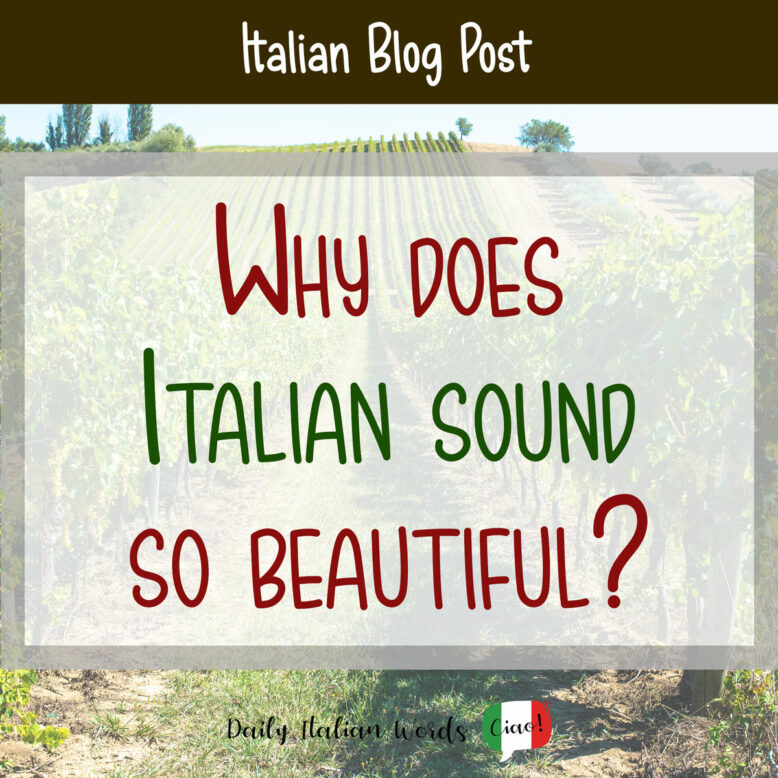The Italian language has a special place in the hearts of many Americans, as well as the British, Australians, and other English-speaking populations. Most of us have a soft spot for an Italian accent and the melodic sounds of the Italian language. But why? What is it about Italian that we find so immensely beautiful, romantic, and pleasing to the ear?

Depending on which researchers you ask, you will receive different answers. Linguists (those who study the science of language) will tell you one reason: we view Italian culture, and thus their language, through a romanticized lens. Phoneticians (those who study phonetics and phonology) will cite another reason: the consonants, vowel sounds, and syllabic stress and patterns have a pleasant ring to our English-speaking ears.
But more than likely, both scientists are correct. The reason we love Italian is likely a combination of numerous factors as we’ll see below.

Ever since the Middle Ages, Italian linguists have strived to develop a beautiful, aurally-pleasing sound. If we take a trip back in history, we will discover that the Italian language, as we know it today, was (and truth be told, still is) incredibly diverse region by region, city by city. Italians from Veneto in the Middle Ages spoke a different form of “Italian” than those from Calabria.
In the 13th century, the Sicilian School, a group of literary masterminds, wanted to elevate the Italian language. They wished to mould and modify Italian into a language worthy of the finest poems and novels. The School sought to find the greatest literature and use the authors’ templates to define a new level of Italian excellence.
In the following centuries, writers and poets discovered the highest level of artistic perfection in the works of Tuscan artists Dante, Francesco Petrarch, and Giovanni Boccaccio. Dante was a Florentine man, and his works reflected his Florentine dialect. Petrarch and Boccaccio, while not from Florence, followed Dante’s example and also wrote using the Florentine style. These three writers, these men whose works were inspired by ancient Latin, became the scaffold for Italian literary excellence; their shadow became the established pinnacle of Italian beauty.
Fun Fact: When Italy merged from city-states into one unified country, the Italians needed to decide upon one dialect to be the official standard of Italian. Because of Florence’s linguistic and literary history, the Florentine dialect was elected to be the norm that all schools and businessmen across the country should aim to utilise. The concept is very similar to today’s views of English as the official language of business in international commerce.

According to the Phonetician
According to the phonetician, Italian is pleasantly perceived by our ears for a whole host of scientific reasons.
First, we have the purity of vowels. The Italian language has 7 spoken vowel sounds (compared to our 20 in English). The 5 vowel letters can only be pronounced in one, sometimes two, ways. No exceptions. The neutral schwa ⟨ə⟩, a vowel that frequently appears in unstressed English syllables, does not exist in traditional Italian. The clear sound, easy to read and pronounce, gives a satisfying consistency to the Italian language.
Second, the Italian language utilises far fewer glottal stops than the English language. On a similar note, the Italian language has an even distribution of vowel sounds and consonants. Indeed, it is extremely uncommon to encounter an Italian word with many consonants in a row. If you take, for example, the Italian phrase Andiamo a casa (Let’s go home), you will find that the ratio of pronounced vowel sounds and pronounced consonant sounds is fairly even. This distribution of sounds and the lack of glottal articulations create an overall smoother sound than in English.

Another contributing factor to the sweet smoothness of Italian is the fact that the vast majority of words end in a vowel sound. There is no harsh ending sound, clipping one word to a close and jarringly disconnecting it from the following word in the phrase. This linguistic aspect keeps the smooth, almost melodic, train of sound flowing gracefully into our ears.
However, the beautiful rhythm naturally occurring in the Italian language comes in the form of consonants. In Italian, consonants have a distinctive phonemic duration, upon which meaning is based. This phenomenon is most obvious in words containing double consonants, such as the words sette (seven), penna (pen) and palla (ball). Were you to pronounce them with single consonants, the meaning would change completely: sete (thirst), pena (penalty) and pala (shovel). It is these double consonants that give a unique rhythm to the Italian language, both when it is sung and spoken.
All of these linguistic elements add to the music-like qualities of the Italian language that we have come to love.

According to the Linguist
Why is the Amalfi Coast so popular as a honeymoon destination? Why do all voice teachers insist their students learn Puccini’s arias? Why does ti amo (I love you) make our hearts swoon? The answer: because it’s Italian.
Even after all the science of phonetics and the intricacies of melodic and rhythmic speaking, there is still something to be said about the socio-cultural perspective.
According to the linguist, our perception of the Italian language is rooted in our views of the Italian culture as a whole. When you think of Italy, you probably think about delicious cuisine, luxurious fashion, grandiose operas, and romantic gondola rides along grand canals. These mental images come into play, even subconsciously, when you hear the Italian language. We equate it with the Arts.

If we equated Italy with power, economic prestige, and military prowess, we might perceive Italian as a powerful language and it could be a far more common second language in the States. Instead, we associate Italy with the concepts of deliciousness, luxury, attractiveness, and of course, romance.
From another perspective, linguists also agree that part of our affection for the Italian language also lies in its similarities with English. Italian sounds familiar to us. Many of the individual sounds that make up the Italian language are also present in the English language. Compared to the jarring unfamiliarity of the Mandarin language, Italian sounds familiar, and therefore, pleasant.

Conclusion
So, why does Italian sound so beautiful? Is it the pleasant similarities to our own language? Is it the mental association with fine arts and beautiful architecture? Or is it the smooth flow of phonemes? The truth is, no scientist can definitively pinpoint a single reason why we love the sound of Italian. Perhaps some things are best left a mystery!

Written by our American contributor in Florence, Lyssa Yapp.
Heather Broster is a graduate with honours in linguistics from the University of Western Ontario. She is an aspiring polyglot, proficient in English and Italian, as well as Japanese, Welsh, and French to varying degrees of fluency. Originally from Toronto, Heather has resided in various countries, notably Italy for a period of six years. Her primary focus lies in the fields of language acquisition, education, and bilingual instruction.



Megaviglioso